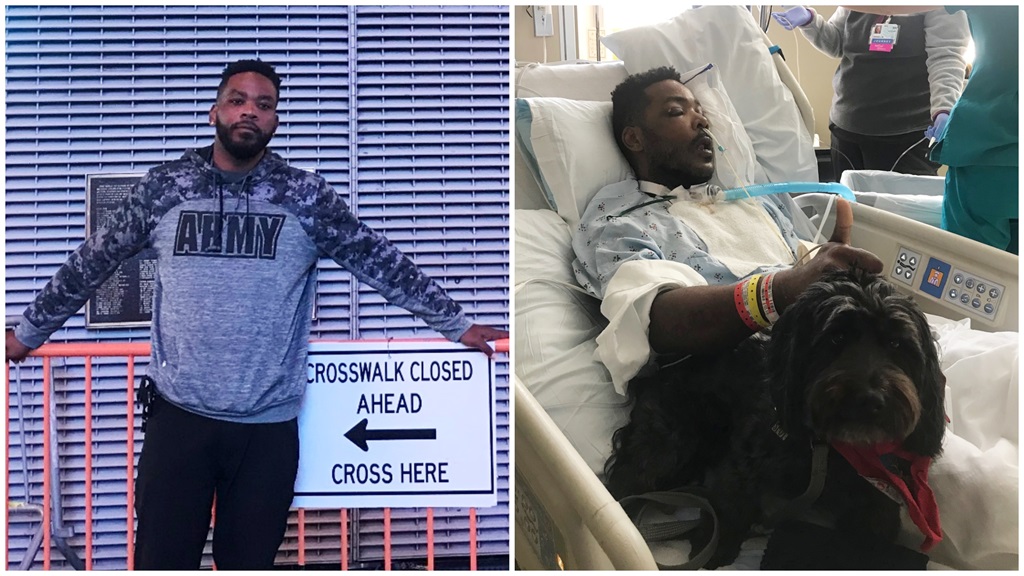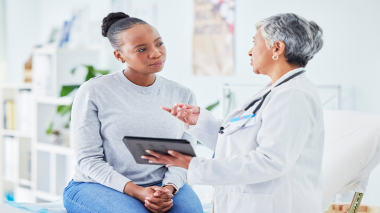Frederick was thinking of his daughter when he got on his motorcycle on the morning of October 18, 2018. It was field day at her school, when the children got to compete in outdoor games, so Frederick designed a special t-shirt for the occasion, took the day off from work, and looked forward to cheering her on.
He doesn’t remember what happened next. After being transported to Atrium Health’s Carolinas Medical Center’s Level I trauma center, he woke up in the ICU.
Frederick was involved in a motorcycle accident, and what began as a quick trip to see his daughter became a long journey to recovery: physical therapy to help him walk again, plastic surgery to help his face to heal, and surgery to bring his voice back.
“The care team, they were the greatest,” Frederick says. “Anything that I needed, anything that my family needed, they’d be right there. It seemed that they personally cared – it wasn’t just a job for them. That’s great while you’re in the ICU because you’re going through so much, physically and emotionally.”
For Edward Teng, MD, the plastic surgeon who helped to reconstruct Frederick’s face, Frederick’s positive outlook was integral as he worked through a tough recovery.
“Despite discomfort from his accident, and not being able to speak because of his tracheostomy, he communicated his appreciation through sign language. At first, I wasn’t sure what he was trying to say, but he made a heart sign with both of his hands to express his love and appreciation,” says Dr. Teng. “I learned that Frederick works with disadvantaged children and it motivated me even more to make sure he could get back to doing meaningful work for the world. After his surgery, despite discomfort through healing, his appreciation never waned.”
During his 21 days in the hospital, friends and family visited Frederick to offer support. One of his favorite visitors was someone Frederick had never met before. His name was Dia, and he could offer Frederick something that few others could: understanding.
Dia’s a volunteer with the Trauma Support Network (TSN). As a teenager, Dia suffered a spinal cord injury that led to a lifetime in a wheelchair. But it didn’t get in the way of Dia’s spirit. Dia has the special gift of being just as easy to talk to as to listen to, who’s always ready to share a story to get a laugh.
“He told me to keep pushing, and he let me know that there are other people out there who’ve gone though this same experience – and if I’m feeling down I can always turn to those people,” Frederick says. “It was very good to hear, because you lose hope sometimes while you’re in the beginning stages of recovery.”
Survivors Supporting Each Other
TSN is a national organization, with 98 chapters around the country. Atrium Health has the only TSN program in the area, and it’s a free service offered to both adult and pediatric trauma patients and their families. Through this program, people who have recently become victims of traumatic injuries, including Traumatic Brain Injury, spinal cord injury, amputation, and traumatic assault, are paired with others who are further along in their recoveries. In addition to one-on-one visits during hospital stays, TSN hosts group sessions for those who want to return for support after they return home. The program offers patients and their families a community of support during a time when it’s needed most.
“Volunteers can establish immediate rapport with a patient just by saying, ‘I used to be in this hospital’ or ‘My room was right down the hall,’” says Leah Hindel, Atrium Health’s TSN coordinator. “They can empathize like no one else can.”
It’s Hindel’s job to match patients and family members with volunteers. She creates matches based on experiences and personalities. If there’s a married couple who experienced a car crash together, she’ll find a volunteer couple who had a similar experience. If a mother has a child in the hospital after an act of violence, she’ll offer to introduce her to another mother who experienced that as well. Hindel has about 40 volunteers in the program, who have had personal experience with a traumatic incident, or who have had a close family member who has.
“Our volunteers have taken a terrible thing that happened to them – probably the worst thing that has ever happened to them – and turned that into a positive,” says Hindel. “It’s become a way for them to help others.”
Frederick is now back home. Life is returning to normal: he’s back to work and on his way to making a full recovery. He plans to return to the hospital soon; this time, however, he’ll be there a TSN volunteer.
“I want people to know that things happen to all of us, for worse or for better. I want them to know that they’ll be OK,” Frederick says. “Once we go through our own experiences, it’s up to us to go back and help others, to uplift them.”
To learn more about Atrium Health’s Trauma Survivors Network, click here.



